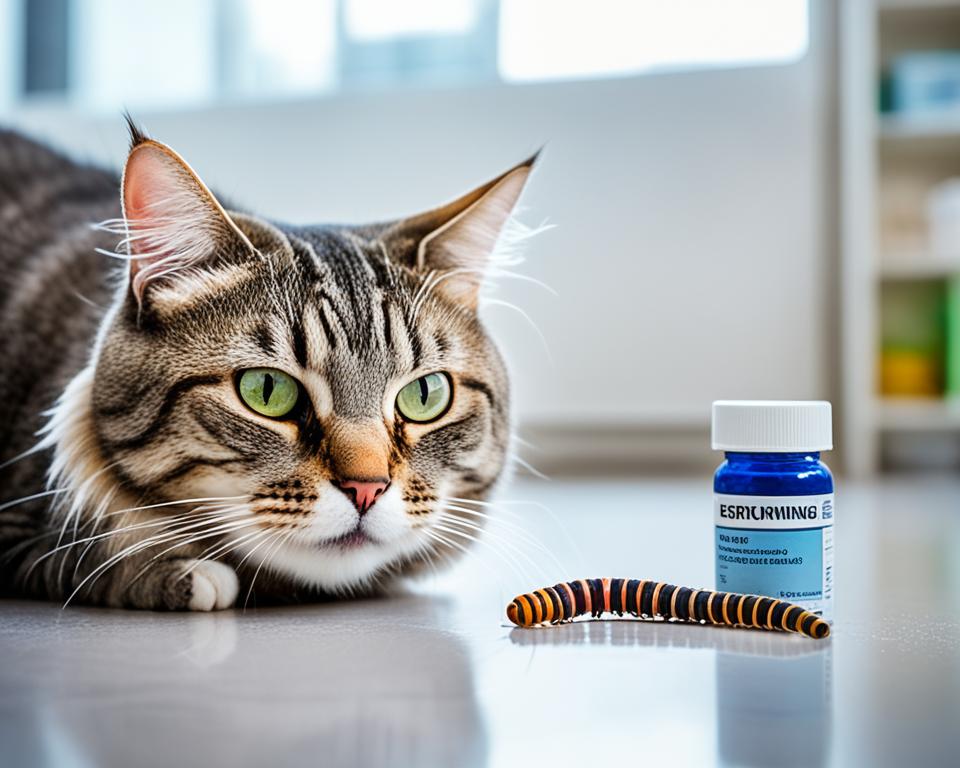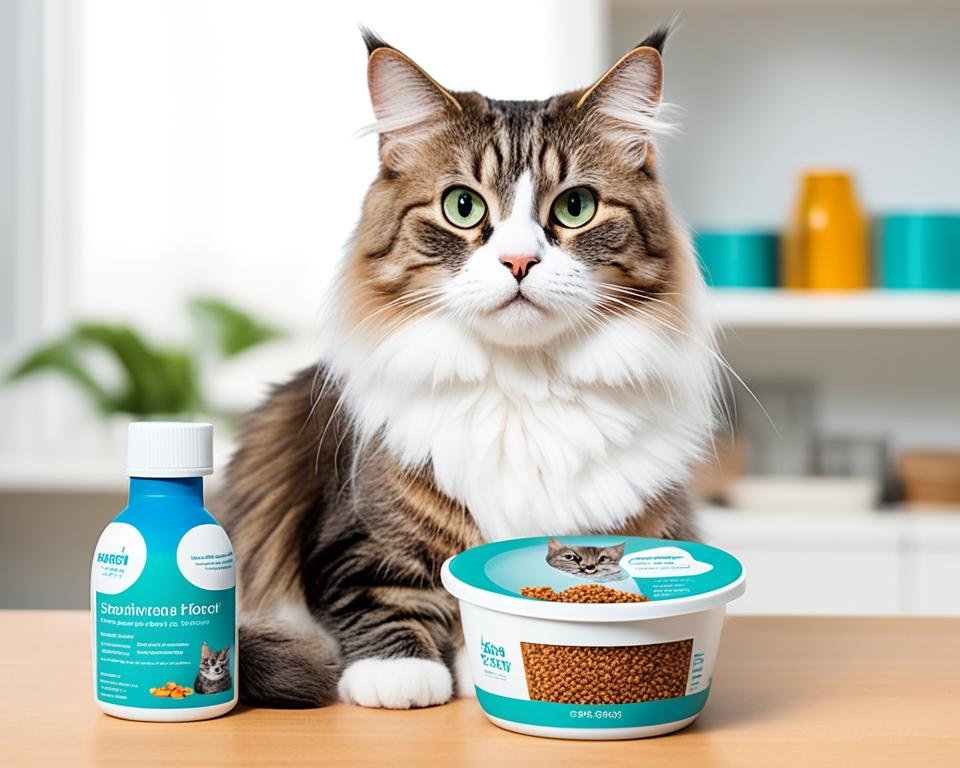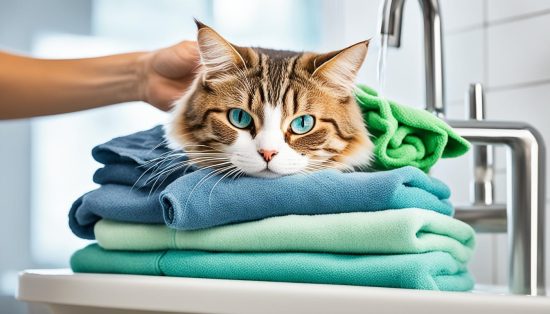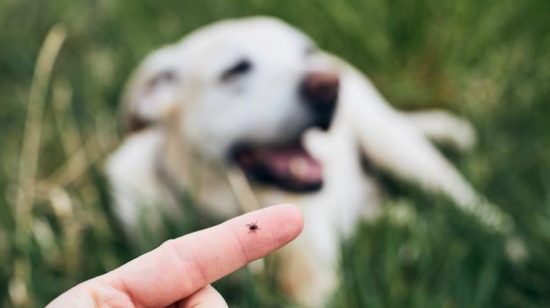What to Expect After Deworming a Cat
Understand your cat’s recovery and observe post-deworming symptoms. Learn the signs of successful treatment and how to manage health post-deworming.

Did you know that deworming medications can lead to mild side effects like nausea, vomiting, diarrhea, and lethargy in some cats? While these might sound alarming, understanding post-deworming symptoms in cats is crucial for a smooth recovery. When you administer a trusted dewormer from reputable stores like Nature Pet Store, it’s essential to be vigilant in observing your cat’s health.
A successful deworming process includes looking out for signs of worm expulsion in cats, such as worms in their stool. This indicates that the medication is working. However, it’s also crucial to be aware of any unusual features in the cat’s stool and any prolonged symptoms. Consulting your vet is recommended if the mild side effects last beyond three days.
Recovery from cat deworming generally varies, with roundworm infections often resolving within days, while tapeworms could take up to a month. Supporting your cat’s recovery involves offering fresh water, bland and easily digestible food, and potentially supplements like Arrowleaf Pet Immuno Boost, which contains turmeric and dandelion for enhanced health post-deworming.
As you monitor your feline friend, maintaining proper hygiene practices such as cleaning and disinfecting litter boxes is vital to prevent reinfection. Proper post-deworming care ensures your cat can bounce back swiftly and remain healthy.
What is Deworming in Cats?

Deworming is a crucial process of ridding cats of internal parasites, particularly intestinal worms, through medication. Roundworms, whipworms, hookworms, and tapeworms are some of the most common intestinal parasites that can afflict your feline friend. These parasites can significantly impact your cat’s health, often causing symptoms like diarrhea, vomiting, and weight loss. In extreme cases, they may even lead to organ damage.
Kittens are exceptionally prone to worms and should start deworming at 6 weeks of age, with repeated treatments at 8, 10, and 12 weeks, followed by monthly doses until they are 6 months old. Regular deworming treatments are vital for maintaining a cat’s health and preventing worm infestations. For adult cats, it’s recommended to use monthly dewormers during summer months and conduct annual fecal examinations to stay ahead of any parasitic threats.
Deworming contributes not only to the health of your pet but also reduces the risk of zoonotic infections like roundworms and hookworvms which can affect humans. Ensuring regular deworming and practicing good hygiene can help keep both your cat and your household safe from parasites.
Why Does Cat Need Deworming?

Deworming your cat is essential to maintain its overall health. Feline deworming is crucial as cats can acquire harmful parasites through various means including contaminated food, water, soil, or interaction with infected animals. Cats, especially outdoor explorers, are prone to ingesting fleas or small animals, which can transmit tapeworms. Regular deworming helps in managing cat’s health post-deworming, ensuring they remain active and healthy.
Virtually every kitten is born with hookworms and roundworms passed on through the placenta or milk from their mother. These parasites can significantly impact their vitality. In extreme cases, hookworms can lead to severe anemia in kittens, while roundworms cause pot bellies and discomfort, disturbing their bowel movements. Moreover, Coccidia and giardia are environmental parasites that result in severe diarrhea and dehydration, drastically affecting the cat’s well-being.
Symptoms of worm infections include poor appetite, weight loss, vomiting, and loose stools. Some common reactions to cat deworming might include temporary changes like diarrhea or vomiting, typically subsiding within 24 hours. Regular deworming protocols are especially vital for cats engaging in hunting activities, as well as household pets, to prevent parasite infestations and manage cat’s health post-deworming.
Tapeworms compete for nutrients in the intestinal tract, leaving cats feeling malnourished. Preventive measures, such as keeping pets on a monthly preventive treatment like Revolution Plus, are strongly recommended by veterinarians. Feline Drontal is a frequently used oral dewormer to combat major intestinal parasites in cats, ensuring your feline friend leads a healthier life free from worm-related issues.
Factors Affecting Deworming Process

The deworming process in cats can be influenced by several crucial factors. Primarily, the type of intestinal parasite present plays a significant role in determining the effectiveness of the treatment. Various parasites like roundworms and tapeworms have different susceptibilities to medications, making it vital to identify the specific worm affecting your cat.
Another essential factor is the number of worms present in your cat’s system. Heavy infestations may require multiple doses or prolonged treatment periods to eliminate the parasites completely. Understanding how long do dewormer side effects last can help you manage your cat’s recovery more effectively.
Your cat’s overall health also significantly affects the deworming process. Cats with preexisting conditions or weakened immune systems may experience prolonged recovery times and are more susceptible to side effects. Common cat dewormer side effects include mild symptoms like diarrhea. Notably, diarrhea after deworming a cat typically resolves within a few days, but continuous monitoring is advisable.
Outdoor exposure and environmental factors can further influence the deworming process. Outdoor cats are at a higher risk of repeated infestations and may require more frequent deworming schedules compared to indoor cats. Regular monthly deworming, along with heartworm preventatives, is strongly recommended for cats that spend time outdoors to maintain their health.
Veterinarians typically start the deworming process by examining a fecal sample under a microscope to detect the presence of parasite eggs. Identifying the specific type of parasite then helps to choose the most suitable medication. Profender is among the most common dewormers applied between the cat’s shoulder blades, especially effective in treating both roundworms and tapeworms.
Consulting with your veterinarian to understand your cat’s particular needs is crucial. Tailoring the deworming process based on the type of worm, your cat’s health, and exposure risks ensures a successful and safe recovery for your feline friend.
Monitoring Your Cat’s Health After Deworming

Monitoring your cat after deworming is vital for ensuring a successful treatment and for spotting any negative reactions. It’s important to be observant and aware of signs of successful deworming in cats. Properly supervised post-deworming care can make a significant difference in your cat’s recovery and overall health.
Checking for Worms in Stool
One of the initial signs of successful deworming in cats is the presence of expelled worms or segments in their stool. This is a normal response post-deworming, indicating that the medication is working to eliminate the parasites. However, if you notice any blood or abnormal stool, it is crucial to seek veterinary advice immediately. Regular stool screenings can help detect any remaining parasites and confirm the effectiveness of the deworming treatment.
Observing Behavioral Changes
After deworming, it’s important to keep a close eye on your cat’s behavior. Common temporary side effects may include vomiting after deworming a cat, diarrhea, appetite loss, and lethargy after deworming a cat. These side effects typically resolve within 24 to 72 hours. If your cat exhibits severe or persistent symptoms, such as prolonged vomiting or diarrhea, contact your veterinarian promptly. Adequate post-deworming monitoring ensures that any complications are addressed swiftly and effectively.
What to Expect After Deworming a Cat
Post-deworming, it’s important to keep an eye on your cat for any cat deworming side effects. These might include nausea or vomiting, diarrhea, loss of appetite, or lethargy. Some cats may also display more severe
Potential Side Effects
Common post-deworming symptoms in cats can be vomiting, diarrhea, appetite loss, and lethargy. While these reactions are generally mild and temporary, they can sometimes be more severe and necessitate veterinary attention, especially if they persist beyond three days. Immediate vet attention is required for allergic reactions or unusual symptoms like vomiting blood.
Managing Side Effects
To manage cat deworming side effects, ensure that your cat has plenty of water available to prevent dehydration. Offering bland food can ease an upset stomach, and a calm environment will aid recovery. Supporting your cat’s immune system with supplements like Arrowleaf Pet Immuno Boost, upon vet advice, can be beneficial. Always monitor your cat and consult your veterinarian if any severe post-deworming symptoms in cats occur.
Best Aftercare Practices After Deworming
Once your cat has been dewormed, stringent hygiene practices are essential for managing your cat’s health post-deworming. Prompt disposal of feces and regular cleaning and disinfection of the litter box are paramount. In addition, you should wash your hands thoroughly after any contact with your cat’s feces to minimize the risk of reinfection or potential human transmission.
Environmental hygiene is also crucial. Make sure to launder your cat’s bedding frequently and sterilize their toys. This will help prevent any lingering parasites from causing a reinfestation. Diet is another important component to consider after deworming. Offering high-quality cat food and avoiding raw or undercooked meat can enhance your cat’s overall digestive health and prevent future issues.
For managing your cat’s health post-deworming, it’s recommended to provide easily digestible meals such as boiled chicken, fish, scrambled eggs, boiled rice, or mashed potatoes. These types of food will be gentle on your cat’s stomach and can help soothe any digestive disturbances they might experience after the deworming process.
Additionally, herbal supplements like NaturPet Intesti Care or ArrowLeaf Pet D Wormer can further aid in maintaining your cat’s digestive health and preventing re-infestation. Observing cat behavior after deworming is vital as well; watch for signs of vomiting, diarrhea, or loss of appetite, which are common side effects. If you notice any severe symptoms or unusual behaviors, contact your veterinarian immediately to ensure your cat’s well-being.
Things To DO To Stop Risks Of Re-Infection In Cats
To effectively stop the risks of re-infection in cats, adopting consistent and comprehensive preventative measures is essential. Firstly, maintaining a clean environment and practicing good litter box hygiene are fundamental in preventing cat worm infestations. Ensure that your cat’s living spaces, including their bed, toys, and litter area, are cleaned regularly. This will minimize the presence of parasitic eggs that can lead to re-infection.
Limiting your cat’s outdoor activity is another critical step. Outdoor cats are more prone to ingesting roundworm eggs from accidental hosts such as earthworms, cockroaches, rodents, and birds. By keeping your cat indoors, you reduce their exposure to these potential sources of infection. Additionally, avoid letting your cat hunt or consume raw prey, as these can be sources of parasitic worms.
Adhering to a regular deworming schedule tailored to your cat’s specific needs by the vet is crucial. Cats, especially nursing females and kittens, should be treated with deworming medications to stop the cycle of re-infection. It’s also important to utilize heartworm preventive products that contain medications to treat roundworm infections. Lastly, ensure flea and tick treatment compliance, as fleas often carry tapeworms, leading to re-infestation.
FAQs
What should I expect after deworming my cat?
After deworming your cat, you may notice worms in their stool, indicating the treatment’s effectiveness. Your cat might also experience mild gastrointestinal symptoms like diarrhea, vomiting, changes in appetite, or lethargy, which typically resolve within a few days.
What is deworming in cats?
Deworming in cats is a process that eliminates internal parasites, such as intestinal worms, through medication. This treatment helps prevent health issues like diarrhea, weight loss, and potential organ damage.
Why does my cat need deworming?
Cats need deworming to remove parasites they can acquire through contaminated food, water, soil, interactions with infected animals, or fleas. Regular deworming helps maintain your cat’s health and prevents the spread of parasites to other pets and humans.
What factors affect the deworming process in cats?
Several factors influence the deworming process, including the type of parasite, the number of worms present, the specific medication prescribed, and the cat’s overall health. Consult with your vet to select the right dewormer for your cat’s needs.
How should I monitor my cat’s health after deworming?
Post-deworming, monitor your cat’s stool for worms or segments and be alert for any abnormal features like blood. Observe their behavior for signs of vomiting, diarrhea, appetite loss, and lethargy. If these symptoms persist beyond three days, contact your veterinarian.
What are the potential side effects of deworming a cat?
Potential side effects of deworming a cat include nausea or vomiting, diarrhea, a drop in appetite, and lethargy. Although rare, allergic reactions to the medication may occur and require immediate veterinary attention.
How can I manage my cat’s side effects after deworming?
To manage your cat’s side effects after deworming, ensure they have plenty of water to prevent dehydration and offer bland, easily digestible food. Creating a calming environment can also help in their recovery. If severe or persistent symptoms occur, contact your veterinarian.
What are the best aftercare practices after deworming my cat?
Best aftercare practices include maintaining stringent hygiene, such as prompt disposal of feces, cleaning the litter box regularly, and washing your hands after contact. Providing high-quality cat food and considering herbal supplements like NaturPet Intesti Care can further support your cat’s digestive health.
How can I stop the risk of re-infection in my cat?
To prevent re-infection, maintain a clean environment, limit your cat’s outdoor activity, and ensure flea and tick prevention. Avoid allowing your cat to hunt or consume raw prey, and adhere to a regular deworming schedule tailored by your vet.







